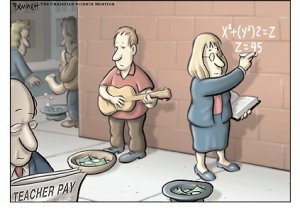Albania: Teachers’ salaries to be increased but many problems remain
Published:
On 17 October 2016, in a meeting with teachers’ representatives from all over the country, and in the presence of the Minister of Education and Albanian education trade unions leaders, the Albanian Prime Minister, Edi Rama, and the Minister of Finances, Arben Ahmetaj, announced that teachers’ salaries will be increased by around 10 percent (since 2013), starting from March 2017. This is really good news for more than 30 thousand teachers and other employees in the education sector in Albania. It is a result of an intensive work done by education trade unions in the framework of the Collective Agreement and negotiations with the Ministry of Education and the Albanian Government regarding the improvement of teachers’ working conditions, as a precondition for quality education for all children in Albania.
Increasing teachers’ salaries has always been one of the main commitments of education trade unions in Albania, Trade Union Federation of Education and Science of Albania (FSASH) and Independent Trade Union of Education of Albania (SPASH). The collective agreement with the Ministry of Education and Sports, which is in effect until the end of May 2017, stipulates that “both parts, (the Ministry of Education and education trade unions), agree to work together for creating a better wage system which would make possible a better evaluation of teachers and a better motivation of them, through the process of reformation and modernisation of the education and teaching profession”.
Special efforts have been made by Albanian trade unions regarding the increase of teachers’ salaries during the last two years, first of all, because of the fact that, despite some improvements, teachers’ salaries in the pre-university education system in Albania continue to be very low, an average of 390 EUR per month in primary education and around 420 EUR per month in secondary education. Secondly, there has been no pay increase for teachers during the last three years, because of the financial situation in the country and for other reasons, such as, for example, the Government claiming that reduced taxes indirectly increase teachers' salaries or that it should give a priority to social groups in more financial need than teachers.
Such situation has not been accepted by Albanian education trade unions, who expressed their discontent through negotiations with the Ministry during 2015-2016, pointing out at what the Collective agreement stipulates regarding yearly salary increase: “The employer (The Ministry of Education and Sports) accepts the request of the trade unions that the yearly increase of teachers’ salaries in the pre-university education system will not be lower than the official percentage of inflation in the country”.
These problems were also among the main issues discussed at the 7th Congress of FSASH, held in Tirana on 24 September 2016, and became an important part of Congress Resolution. The Chairman of FSASH, Arjan Dyrmishi, says: “We consider the announcement regarding wage increase a very important step, but, at the same time, we will keep on fighting for a continuous increase of teachers’ salaries, as well as for resolving many other problems, especially, for keeping all teachers in the education system, for giving them the annual remuneration at the end of the year, for improving their working conditions and their professional development”.
The Collective Agreement also provides for an annual remuneration of around 80 EUR that has to be given by the employer to all teachers in the pre-university system by the end of the year. However, it has not been paid for the last three years, which caused a strong negative reaction from teachers and their trade unions. FSASH and SPASH already started negotiations with the Ministry on this issue clearly stating that they will not accept any more excuses and that they expect the remuneration being fully paid to all teachers by the end of 2016.
Another big problem in Albania is keeping all teachers employed in the education system: with the number of pupils decreasing every year because of the demographic changes and mass emigration of Albanian families, a considerable number of teachers is at risk of losing their job. For example, in Shkodra district, more than 400 teachers this school year have less teaching hours than the minimum defined by the Ministry of Education. Under these conditions, the Ministry decided to reduce their salaries, depending on their missing teaching hours, which caused a strong objection from FSASH and SPASH regional offices in Shkodra. They organised a protest in front of the Regional Education Directorate, which forced the Ministry to enter into negotiations with FSASH and SPASH regional offices, as well as FSASH and SPASH Presidencies, in order to find a temporary solution. However, the problem remains and education trade unions are trying to find a long term solution on the national level, for example, through reducing the number of pupils in the class and reducing teaching hours for teachers, especially in some school subjects.